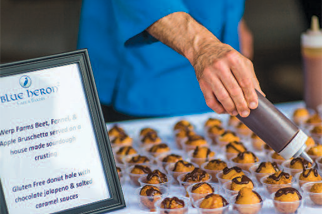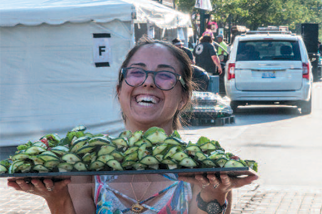Starring Role
The 2017 Traverse City Film Festival (TCFF) wrapped up on July 30 after a full week of films, festivities and fun. In all there were 229 screenings and events; 120,000 admissions; 235 visiting filmmakers, industry guests and musicians—and a food program that fueled it all from start to finish.
Teaming up with Taste the Local Difference (TLD), the festival became a certified local food event, surpassing even its own goals to achieve 40% local offerings for the first time in its 13 years. We sat down with Tricia Phelps, TLD operations director and long-time TCFF supporter, to learn more about how their certification works, how it impacts the local food system and what it was like to work this year’s film fest.
Edible Grande Traverse: How did TLD help change the food offerings at TCFF?
Tricia Phelps: The whole festival is a huge machine and it takes tons and tons of people to make things happen. When I first started in 2015, there was a list of people who had donated in the year before. So early on, my challenge was to take those folks who were with the film festival who were also interested in participating, and challenging them to incorporate local food as a new element. Obviously, not everybody comes back every year so in the following years, my job also involved finding new vendors and new producers that were more in line with sourcing locally.
This year, we challenged all of the producers to incorporate as much local food as they could. We don’t certify each individual vendor so there’s obviously people who do much higher than 50 percent. Some are up in the 70s or even the 90s and, for other folks, it’s not possible to donate those types of things. So it’s working with all of these people and trying to collectively increase that local percentage.
I also reached out to specialty growers. Local food producers in this region have a lot to share and really good products to showcase, so bringing them directly into the event is a simple way for me to incorporate more local food into the festival.
EGT: What foods were local and what impact might that have had on the local economy and/or specific farms and businesses in our foodshed?
TP: Well, I can say this festival alone contributed over $20,000 to the local food economy. For the Founders’ Party we work closely with the Great Lakes Culinary Institute. And for the other parties we coordinated with more than 60 different restaurants and local food producers in the area. At the Opening Night party we had 18 different vendors, so that’s just one event and eight of those vendors sourced nearly 100 percent local ingredients.
There is also a lot of produce incorporated that is local. This year, produce was from Second Spring Farm & Gallagher’s Farm Market with garlic hummus from The Redheads. Obviously there is a lot of great food that restaurants provide, but some of it can be heavy. So we try to incorporate produce directly from the farms with veggie platters so people can have a light snack that’s 100% local, too.
EGT: How did the certification come about and where it is going?
TP: It came about by a request from farmers a couple of years ago. There was a lot of momentum happening with farm-to-fork in Traverse City, but nobody was asking or encouraging event promoters and organizers to do anything like that. At the same time, the idea of “local-washing” was on the table too. Farmers felt, like, “Yeah, we want to encourage them to do this and to brag about it, but we also want it to be authentic and want someone to be able to verify that they’re actually sourcing locally.” While these farmers saw a great marketing opportunity they didn’t necessarily know the right people or have the time to make it happen. So we came up with this program as a way to encourage event venues and organizers to source locally and brag about it, but to also verify their support for local farming and food producers with our third-party certification.
EGT: What does “local” mean to Taste the Local Difference?
TP: “Local” to us means within the state of Michigan. At the same time, we have seen that local is different for every person. We want to give each event organizer the authentic experience, too. We work with our partners to identify their specific idea of what local is. For example, Northern Michigan Small Farms Conference requires 40 percent to be local within 125 miles and then 70 percent to be local within the state of Michigan. We make sure that those numbers happen.
EGT: So when it comes to locally produced versus locally processed, is there a distinction that you think is important?
TP: We don’t grow coffee or a lot of chickpeas in Michigan but there are at least 15 people that work for Higher Grounds and at least five people working for The Redheads that live here in Traverse City and contribute to the economy that way. We are always pushing locally grown as much we can but we also value the food that’s being produced here as long as it’s adding new jobs and new economic growth to this community.
EGT: What are some of the hurdles that you have to overcome with this certification? In other words, what are the greatest limitations to getting 100% local food events?
TP: Frankly, the biggest difficulty with the certification is getting paperwork in on time. When a producer is pulling together the menu and prepping everything for an event, it is difficult for them to sit down and fill out an ingredient sourcing form. At first, people didn’t really understand it, they didn’t know why they were doing it. Now, there’s a number of restaurants that have gained familiarity through practice over the last two years, so they have it down. They fill out the sourcing form the minute they make their order so it is off their plate and they understand the importance of why they are doing it.
EGT: Are there any particular foods groups that are important to include but difficult to get traction on?
TP: There are a lot of restaurants here that make local sourcing a part of their business everyday and it is not a struggle for them. But I really enjoy doing this certification with vendors who are not so familiar with the process because it is a way for us to be a resource and to show them local sourcing. Vendors who are involved in an event like TCFF are challenged and the certification creates the opportunity for us to have those conversations where we otherwise would not. Sometimes you are opening their eyes by saying, “The product that you use a lot of and many that you’ve outlined are products that we grow in Michigan, and here is a farmer you can get it from and, by the way, the price is not that different!”
EGT: What audiences has this certification served and are you seeing trends in the types of events organizers that seek it?
TP: I would say a large number of them have been food and farm related, which makes sense. But at the same time, events with a food and farming focus are really important because there will be conferences on health care where they are serving hot dogs or there will be events where you are learning how important it is to source locally and then you are eating lettuce from California. I think it’s just as important to make sure that those events are walking the walk as it is to expand into other realms. But we do try to branch out and have worked on things like the Red Drive Concert Series, the Clean Energy Conference and the equestrian festival that are not food-focused events.
EGT: Why is it hard to get participation? Put another way, what most interferes with being able to put on 100 percent local food in our events?
TP: Cost is always a major factor for folks. Both the cost of the ingredients to producers and the end cost to the consumer. But another factor has to do with how many vendors we are working with.
When we are working with a single vendor, it’s easier to get to 100 percent local because we are having a concrete conversation and an event organizer backing us, saying “We want this restaurant and we want it to be this percent local.” It is a much harder thing to do when we have four film festival parties and we are trying not only to organize all these people to participate, but then to have these conversations when we’re working with 30-plus organizations. It’s much harder to get everybody on the same page working with multiple vendors. But it’s completely possible and, there are many events where vendors have been as close to 100 percent as they can be, apart from the spices that they use.
EGT: So, did you get to enjoy films or parties?
TP: We do get to attend each party. It’s work at first, organizing the vendors and making sure they have everything they need, then making sure the big rush of guests gets into the party easily by helping out with will call, but then we get to enjoy it for awhile. Refilling the local fruit and veggie trays as needed, but otherwise relaxing and taking it all in.
EGT: What about any favorite films this year? Recommendations for people looking at next year’s TCFF?
TP: I actually made it to two films this year, too, and my favorite was Wasted! The Story of Food Waste. It was a Food on Film screening and featured food rescue, which we actually did at the festival.
EGT: Thank you, Tricia, that’s a wrap! We’re already looking forward to next year’s films, and the food, too.
In 2015 the Traverse City Film Fest launched a series that pairs food films with small plates from local chefs and includes a panel discussion after each film. If you weren’t able to attend yourself, these 2017 films will make for great entertainment at home in the coming year. Inviting a few friends for lively discussion afterward and some good food to share might just replicate the experience of the film fest. So sit back and enjoy the show!
Double Feature:
Dinner in Abruzzo/2017/NR First, take a culinary journey through the Abruzzo region of Italy, the “greenest region of Europe,” with two of Detroit’s finest chefs. When Luciano Del- Signore of Southfield’s Bacco Ristorante returns home for his cousin’s wedding, he recalls what made him fall in love with the farm-to-table simplicity of Abruzzo culture. Knife
Skills/2017/USA/NR Then visit Cleveland, where Brandon Chrostowski prepares to open his fine-dining establishment with a staff composed nearly entirely of recently released prisoners looking to get their lives back on track. They enter classical French food boot camp to learn the ins and outs of fine wine, sauces and more—showing the fundamental power of food to bring people together.
First Growth/2015/France/NR A cosmopolitan wine critic must return home to help revive his family’s failing vineyard. There, he butts heads with his gruff father, and it becomes clear the so-called wine expert may not know the first thing about the fine art of making wine. Set in the stunning heart of Burgundy wine country and vintage in its distinct feel-good pleasures.
New Chefs on the Block/2017/USA/NR After politics, the restaurant business might be the most brutal and cutthroat industry around: An estimated 30 percent of restaurants close within one year of opening. Follow the drama of two would-be Washington, DC, restaurateurs—one chic, one down-home—as they both move from initial construction to opening night and, ultimately, on to supreme success—or failure.
Soul/2016/Spain/NR A sumptuous documentary about two of the world’s greatest chefs. Japan’s Jiro Ono (Jiro Dreams of Sushi) and Spain’s Eneko Atxa (of the three-Michelin-star restaurant Azurmendi) may seem like they hail from two vastly different culinary worlds. But the master chefs share a deep respect for ingredients—particularly produce and fish—as well as a mutual reverence for local and national traditions. With beautifully shot food footage, this is a two-for-one special that will leave you craving more.
Wasted! The Story of Food Waste/2017/USA/NR Anthony Bourdain is pissed off—but this time his ire is directed at a righteous cause. While it’s challenging enough to comprehend how 1.3 billion tons of food each year could possibly go to waste, what’s even more gut wrenching is how much of that is thrown out before it reaches anyone’s plate. But mindful chefs, including Mario Batali, and organizations of all kinds are taking action against food waste, and this doc will show you what you can do, too.
Film descriptions adapted from TraverseCityFilmFestival.org. For more film details, visit the website.









